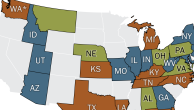Economy & Work

Women are a rising share of U.S. managers and professionals
In 2023, 46% of all managers in the U.S. were women. This is up from 29% in 1980 but still slightly lower than the 49% of all workers who were women as of 2023.

How Americans view trade between the U.S. and China, Canada and Mexico
Americans are most skeptical about U.S. trade with China: 10% say it benefits the U.S. more than China, while 46% take the opposite view.

U.S. Workers Are More Worried Than Hopeful About Future AI Use in the Workplace
American workers have mixed feelings about how AI technologies, like ChatGPT, will affect jobs in the future.
Sign up for our weekly newsletter
Fresh data delivered Saturday mornings
All
Economy & Work
Publications
- short reads
Which jobs do Americans most associate with science?
From agriculture to auto repair, Americans say a wide variety of jobs rely on at least some science knowledge.
- short reads
In many countries, views of the national economy are closely related to partisanship
In nearly all the countries we surveyed, supporters of the governing party view their economy more positively than nonsupporters.
- short reads
Columbus Day, Indigenous Peoples Day or just a regular Monday? It depends on where you are
30 states and three U.S. territories recognize Columbus Day in some form, but only 20 states and two territories make Columbus Day a paid holiday for state workers.
- short reads
About 1 in 5 U.S. workers now use AI in their job, up since last year
Workers younger than 50 and workers with a bachelor’s degree or more education are among the most likely to use AI in their job.
- short reads
Most Americans continue to rate the U.S. economy negatively as partisan gap widens
Nearly three-in-four U.S. adults (74%) say economic conditions are only fair or poor, up slightly from 72% in January 2024.
- short reads
Americans increasingly see legal sports betting as a bad thing for society and sports
Today, 43% of U.S. adults say the fact that sports betting is now legal in much of the country is a bad thing for society, up from 34% in 2022.
- short reads
Congress has long struggled to pass spending bills on time
Congress has passed all its required appropriations measures on time only four times in nearly five decades.
- short reads
Majorities of adults see decline of union membership as bad for the U.S. and working people
The share of U.S. workers who belonged to a union in 2024 stood at 9.9%, down from 1983 when 20.1% of American workers were union members.
- report
Trump’s Tariffs and ‘One Big Beautiful Bill’ Face More Opposition Than Support as His Job Rating Slips
Six months into his term, far more say President Trump is making the way the federal government works worse than making it better.
- short reads
Key facts about the U.S. national debt
Private investors are the biggest holders of national debt – $24.4 trillion as of March 2025 – followed by federal trust funds and retirement programs.









